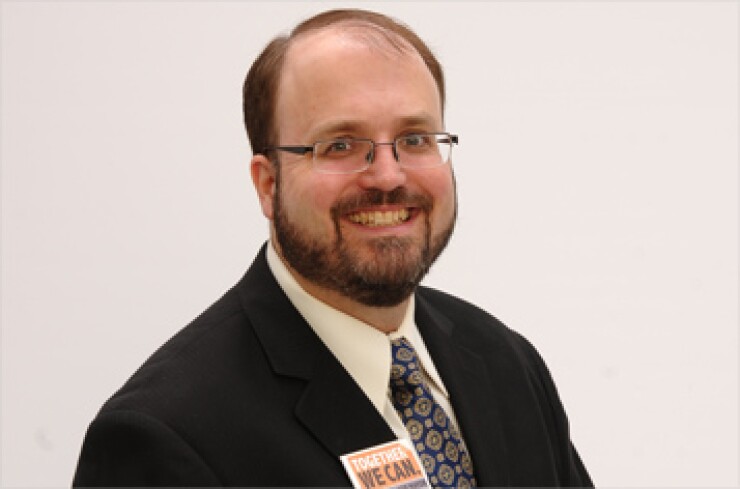
Eric Papenfuse plans to get to work right away after his swearing in as Harrisburg's 34th mayor at 10 a.m. Monday.
For openers, he will hold no inaugural ball in Pennsylvania's capital.
"These are austere times, and any money, even private money, would have taken away from something else that could benefit the city," Papenfuse said in an interview.
The 42-year-old owns the Midtown Scholar Bookstore, a converted 1920s theater in the city's historic Broad Street Market that sits several blocks north of the state capitol and hosted many public meetings during the city's debt crisis.
Predecessors Stephen Reed and Linda Thompson held inaugural galas at such places as the Harrisburg Hilton and the Pennsylvania Farm Show Complex and Expo Center.
Papenfuse will be the face of Harrisburg's post-recovery era. He defeated Thompson and city controller Dan Miller in the Democratic primary and Miller again in November, when the latter ran as a Republican.
State-appointed receiver William Lynch on Dec. 23 filed closing papers on the so-called Harrisburg Strong plan, which Lynch said will keep the city out of bankruptcy court.
"Now we move into a newer phase where the whole focus of activity will be more operationally oriented, more day-to-day city activity as the city comes to grips with changing the way it's done business for years," Lynch, a retired Air Force general, said last week.
The plan erases about $600 million of crippling debt through the sale of the city incinerator, a 40-year lease of parking assets, creditor haircuts, a balanced budget for four years and funding for infrastructure improvements — including street lighting to help combat rising crime — and economic development incentives.
The latter, especially, appeals to the Yale-educated Papenfuse, who is forming a commission on economic development.
"We don't have a major emphasis on that right now," he said. "We want to attract businesses and incentive development. The [recovery] plan just gives us a brief window of opportunity for three or four years. Looking beyond that we need people to invest in Harrisburg.
"Harrisburg has a long history of small businesses and corner stores," he said. "Our buildings are still there but the entrepreneurs are going to Lancaster and other parts of central Pennsylvania. We need to do a better job at marketing and creating business incentives."
The recovery plan should offset any need for Harrisburg to re-enter the debt markets, where it has been a pariah the past few years, anyway. "We have to establish ourselves as credit worthy and financially responsible," said Papenfuse.
Another Papenfuse emphasis is to avoid the kind of notorious secrecy and infighting that pushed the city into receivership.
A series of complex, opaque transactions during Reed's 28 years largely accounted for roughly $363 million of debt related to the incinerator, which became a dark, foreboding symbol of Harrisburg's gloom.
Papenfuse himself said he encountered efforts by federal authorities to silence him in 2007 when he resigned from the Harrisburg Authority, the public-works agency that until last month owned the incinerator. He
Papenfuse told the committee that after he asked then-attorney general Tom Corbett — now the governor — in October 2007 to investigate the financings, the FBI's public corruption office in Harrisburg told him not to speak publicly about the case because an investigation was ongoing, and that the U.S. attorney's office could prosecute him for obstruction of justice if he continued to do so.
The Securities and Exchange Commission in May charged Harrisburg with securities fraud for providing misleading public statements while city finances worsened, though under a settlement with the city it neither fined nor prosecuted anyone.
Thompson, a former city councilwoman who served one four-year term after Reed, had a prickly relationship with the council, which three times — all by 4-to-3 votes — rejected a Thompson-endorsed recovery plan proposed by the state, prompting legislation and an order by Corbett declaring a state of fiscal emergency for 49,000-population Harrisburg. Thompson even once posted on the city's website that her four council opponents were "unfit to hold office."
Papenfuse, by contrast, considers all seven council members "transitional partners." He's also moving council office space up from the City Hall basement. "They were behind the boilers, really an awful space," he said. "Now they'll have some decent office space and some meeting rooms. It's just a matter of doing things differently, with more collaboration and a positive working relationship."
Papenfuse, a Baltimore native, settled in the Harrisburg area in 1999 when his wife, Cathy, took a job as an assistant history professor at Messiah College in Mechanicsburg, across the Susquehanna River. Papenfuse himself taught Latin at Central Dauphin East and Linglestown junior high schools, and chaired the foreign language department at the latter.
"I liked the way the region was situated around beautiful hills, near a gorgeous rolling river along the Appalachian Trail, yet still in a transportation nexus with Baltimore and Philadelphia close by," said Papenfuse, who has three children.
Papenfuse said perceptions of Harrisburg already are starting to change.
"The completion of the Strong Plan will make a big difference," he said. "That plan itself came about thanks to bipartisan cooperation and regional cooperation. We're projecting positive energy and a pro-business atmosphere. People who left are now starting to say, 'Hey, wait a minute.'
"We have to keep the momentum going."





